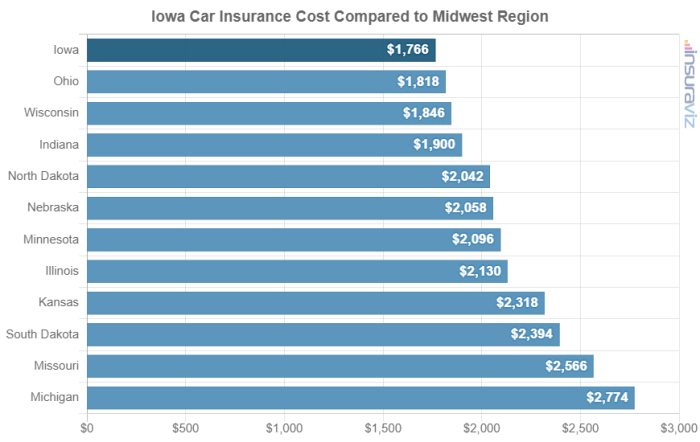Securing the right car insurance in Iowa is crucial for responsible drivers. This guide delves into the intricacies of Iowa’s insurance landscape, providing essential information to help you understand your obligations, find affordable coverage, and navigate potential claims. From understanding minimum coverage requirements to exploring various policy options and finding the best provider for your needs, we aim to empower you with the knowledge necessary to make informed decisions about your car insurance.
Iowa’s car insurance regulations, like those in many states, balance the need for driver protection with the realities of affordability. This guide unpacks the key factors that influence your premium, offers strategies for securing the best rates, and explains the processes involved in filing a claim or managing an SR-22 requirement. Understanding these elements is key to ensuring you have the appropriate coverage and avoid potential penalties.
Iowa Car Insurance Requirements

Driving in Iowa requires adhering to specific car insurance regulations to ensure financial protection in case of accidents. Understanding these requirements is crucial for all drivers to avoid penalties and maintain legal compliance. This section details the minimum coverage levels, potential penalties for non-compliance, and various types of insurance coverage available to Iowa drivers.
Minimum Car Insurance Coverage in Iowa
Iowa mandates minimum liability coverage for all drivers. This means you must carry insurance that covers damages you cause to others in an accident. The minimum required liability coverage is 20/40/15. This translates to $20,000 for bodily injury per person, $40,000 for bodily injury per accident, and $15,000 for property damage. It’s important to note that this only covers damages to others; it does not cover your own vehicle or medical expenses.
Penalties for Driving Without Insurance in Iowa
Driving without the minimum required car insurance in Iowa carries significant penalties. These penalties can include fines, license suspension, and even vehicle impoundment. The exact penalties can vary depending on the specific circumstances and the number of offenses. Repeat offenders face even more severe consequences. Furthermore, being uninsured can lead to significant financial hardship in the event of an accident, as you would be personally responsible for all damages.
Types of Car Insurance Coverage in Iowa
Several types of car insurance coverage are available in Iowa, offering varying levels of protection. Liability insurance, as discussed, covers damages to others. Collision coverage protects your vehicle in accidents, regardless of fault. Comprehensive coverage protects your vehicle against damage from events other than collisions, such as theft, vandalism, or hail damage. Uninsured/underinsured motorist coverage protects you if you’re involved in an accident with an uninsured or underinsured driver. Medical payments coverage helps pay for your medical expenses after an accident, regardless of fault. Personal injury protection (PIP) covers your medical expenses and lost wages, regardless of fault.
Comparison of Minimum and Recommended Coverage
It is important to consider that the minimum required coverage might not be sufficient to protect you financially in the event of a serious accident. Therefore, carrying higher coverage limits is strongly recommended.
| Coverage Type | Minimum Required | Recommended | Description |
|---|---|---|---|
| Bodily Injury Liability (per person) | $20,000 | $100,000 or more | Covers injuries you cause to others. |
| Bodily Injury Liability (per accident) | $40,000 | $300,000 or more | Covers total injuries you cause to others in a single accident. |
| Property Damage Liability | $15,000 | $50,000 or more | Covers damage you cause to others’ property. |
| Collision | Not Required | Recommended | Covers damage to your vehicle in an accident, regardless of fault. |
| Comprehensive | Not Required | Recommended | Covers damage to your vehicle from non-collision events (theft, weather, etc.). |
End of Discussion

Choosing the right car insurance in Iowa requires careful consideration of your individual needs and risk profile. By understanding the minimum requirements, exploring various coverage options, and employing strategies to lower your premiums, you can secure affordable and adequate protection. Remember to compare providers, read policy details carefully, and don’t hesitate to seek clarification from insurance agents to ensure you’re making the best choice for your circumstances. Driving safely contributes significantly to lower premiums, making it a key factor in managing your insurance costs effectively.
Clarifying Questions
What happens if I get into an accident and I’m not at fault?
Even if you’re not at fault, your collision coverage will typically cover repairs to your vehicle, less your deductible. Your liability coverage will cover the other party’s damages and injuries.
Can I get car insurance if I have a DUI on my record?
Yes, but it will likely be more expensive. Insurance companies consider DUI convictions high-risk factors, leading to significantly higher premiums or even denial of coverage in some cases. You’ll need to shop around and be transparent about your driving history.
How often can I change my car insurance provider?
You can typically switch providers at any time, but there may be penalties depending on your current policy. It’s best to check your policy details or contact your insurer to understand the process and any associated fees.
What is the grace period for car insurance payments in Iowa?
This varies by insurance company. Contact your provider directly to confirm their specific grace period policy. Late payments can result in penalties or policy cancellation.